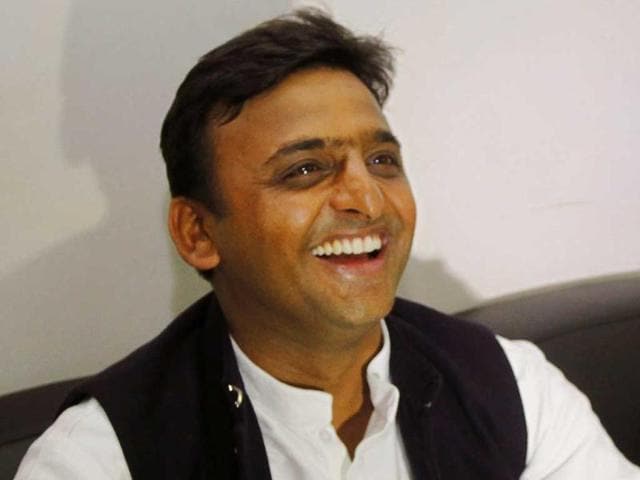Why we are choosing for the near and dear
The poll verdict shows a preference for viable local options. Or at least localised ones, HT writes.
Voting in a state election is like going to a local kirana shop. One checks and compares the items on display, weighs options such as quality and price, and finally picks a 'product' that's on one's shopping list. Unlike general elections, where a product can be ordered for delivery by dint of the brand and the qualities attached to it, assembly polls have a more direct relationship between the 'consumer' - the voter - and the 'product' - the political party. The scale of marketing in state elections is, therefore, more intimate, geared to local requirements and demands. And the branding has to be localised even if it may not be local. Nothing underlines this more than the Uttar Pradesh assembly polls.

While the national media was obsessing about a Mayawati-Rahul Gandhi battle, it was the Samajwadi Party (SP) that picked up the gauntlet and ran with it. To give too much credence to the Congress debacle in the state - and it was a debacle when one considers that expectations were raised by more than just partymen - is to undermine the creditable performance of the SP, especially that of its young and dynamic campaigner-in-chief Akhilesh Yadav. What Mr Yadav did over the last few years and months was to build up and present his party as a clear and cogent alternative to the ruling BSP. This ensured that a possible scattering of votes translating into seats was avoided and that the SP, as the sole viable 'non-Mayawati' party, was chosen resoundingly to do its bit for the people of UP from Lucknow. What aided him in this endeavour was the fact that unlike the Congress or the BJP, the SP's grassroots and organisational presence was already there to be strengthened. For the two national parties, it was always about re-opening local branches in the state. The fact that a local face represented the alternative to the Mayawati government - as opposed to someone from Delhi or Madhya Pradesh camping in the state - gave many voters the comfort and security that is sought after in assembly polls.
Such localisation also provides the advantage of having one's ear to the ground. Mr Yadav was aware that 'Brand SP' had been severely contaminated with the taint of a 'goonda raj'. To a large extent, he addressed this issue without the usual ho-humming. This is the kind of market survey and correction that Congress and BJP leaders failed to undertake - the Congress going to the extent of misreading the mood of 2012 Uttar Pradesh as it went out of its way to promise hand-outs to Muslims, much to the chagrin of non-Muslims who smelled the usual 'minority appeasement' tactics as well as not appealing enough to Muslims who seem to have preferred to give a post-Kalyan Singh SP a try. If upper castes wishing to jump the BSP ship had any inviting boat to jump on to, it certainly wasn't the Congress - or for that matter, the BJP.
Mr Yadav was also at the forefront of a re-branding exercise that jettisoned the old, regressive and parochial (as opposed to regional) selling points of the party (an over-focus on caste dynamics, antipathy towards English education etc). Instead, the SP yoked the traditional caste-community demographics on to a universal developmental vehicle. And the fact that Mr Yadav himself is young, educated, moored to tradition, accessible and the 'boy next door' could not have harmed the party's appeal to an electorate that wanted change, even though it wasn't exactly sure of what change it wanted.
What holds true for UP applies to the other states that went to the polls as well. The Punjab story is a textbook case of how not to make a mess of a traditional advantage. The ruling Shiromani Akali Dal-BJP alliance held on to power not bec-ause the electorate had suddenly woken up to the virtues of trying out a government for more than a term but because the Congress opposition was hardly the alternative that people sought. The infighting within the Punjab Congress didn't help matters at all. In Goa, the BJP was there to reap the benefits of an electorate disgusted with an administration that it identified strongly with rampant corruption. Unlike in UP, the BJP had an empowered local leadership that wasn't remote-controlled at every stage by the headquarters in Delhi. Uttarakhand was the only state that saw an old-style neck-and-neck contest with a hung assembly in the offing. If Manipur saw the Congress triumph, that's largely because chief minister Ibobi Singh ensured that the underrated advantage of being an incumbent - a proactive government is its best endorsement - was availed of for the second time.
As results were pouring in on Tuesday afternoon and before the SP had reached a majority, a commentator on television stated that the two national parties were "not behaving like national parties". What the verdicts, especially that of UP, have driven home is that in assembly elections, the need is to be less 'national' and more local(ised). It simply boils down to trusting - or not trusting - a government that is accountable to the people of the state and not to an entity far away.
Get Current Updates on India News, Lok Sabha election 2024 live, Election 2024 along with Latest News and Top Headlines from India and around the world.



